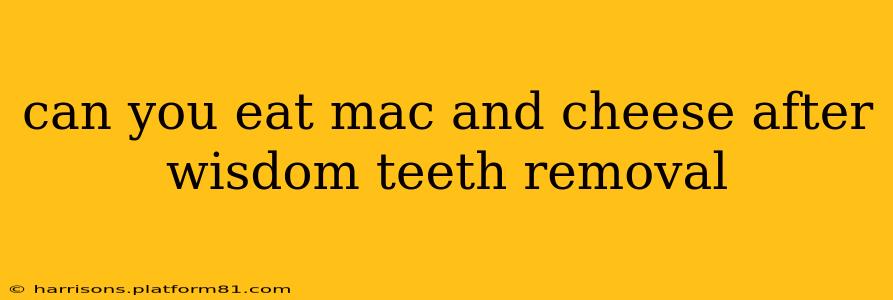Can You Eat Mac and Cheese After Wisdom Teeth Removal? A Guide to Post-Surgery Diet
Having your wisdom teeth removed is a significant procedure, and recovering comfortably involves careful attention to your diet. One of the first questions many patients ask is: Can I eat mac and cheese after wisdom teeth removal? The answer isn't a simple yes or no, and depends heavily on several factors. Let's explore this and other important dietary considerations.
What Can I Eat After Wisdom Teeth Removal?
Immediately following surgery, you'll be on a liquid or very soft food diet. This is crucial to avoid disrupting the blood clots forming at the extraction sites, which are vital for proper healing. Think smooth soups, yogurt, applesauce, and even ice cream (in moderation). The goal is to minimize chewing and keep the area clean.
As your healing progresses, you can gradually introduce softer solid foods. This is where mac and cheese enters the picture.
Can I Eat Mac and Cheese After Wisdom Teeth Removal? The Nuances
The suitability of mac and cheese hinges on its consistency and ingredients. Ideally, you want a very smooth version. Here's a breakdown:
-
The Good: Creamy, well-cooked mac and cheese with a smooth, non-chunky sauce is generally acceptable after the initial healing period (typically a few days). The creaminess coats the mouth, providing soothing comfort.
-
The Bad: Avoid anything with hard, crunchy, or chewy ingredients. This includes:
- Undercooked pasta: Hard pasta pieces can dislodge blood clots or irritate the surgical sites.
- Large chunks of cheese: These require significant chewing, which should be avoided.
- Breadcrumbs or other crunchy toppings: These pose a similar risk to undercooked pasta.
-
The Ugly: Spicy or acidic mac and cheese is generally not recommended in the initial stages of healing. This can lead to irritation and discomfort.
What About the Cheese Sauce?
The consistency of the cheese sauce is key. A very smooth, creamy sauce is less likely to cause problems. Consider using a blender to ensure a perfectly smooth texture if making your own. Store-bought versions are acceptable, provided they meet the criteria above.
How Soon After Surgery Can I Eat Mac and Cheese?
This will depend on individual healing rates and your surgeon's specific instructions. Typically, it's best to wait until the initial swelling and pain subside. Most surgeons suggest waiting at least 24-48 hours before introducing solid foods. Always follow your dentist or oral surgeon's recommendations.
What if My Mac and Cheese is Too Thick or Chunky?
If the mac and cheese is too thick, even after blending, thin it out with a little broth or milk. If there are still visible chunks, it’s best to avoid it until the consistency improves.
What Are Other Good Options for Post-Surgery Meals?
Besides mac and cheese (once it's appropriate), other good options include:
- Smoothies: Packed with nutrients and easy to consume.
- Mashed potatoes: Creamy and easily digestible.
- Scrambled eggs: Soft and gentle on the gums.
- Yogurt: High in protein and beneficial for gut health.
- Pureed soups: Provide necessary nutrients without requiring chewing.
Remember, your comfort and healing are paramount. Always err on the side of caution when choosing post-surgical foods, and don't hesitate to consult your surgeon or dentist if you have any concerns. A smooth, creamy, well-cooked mac and cheese can be part of your recovery, but only after the initial healing phase and if prepared correctly.
